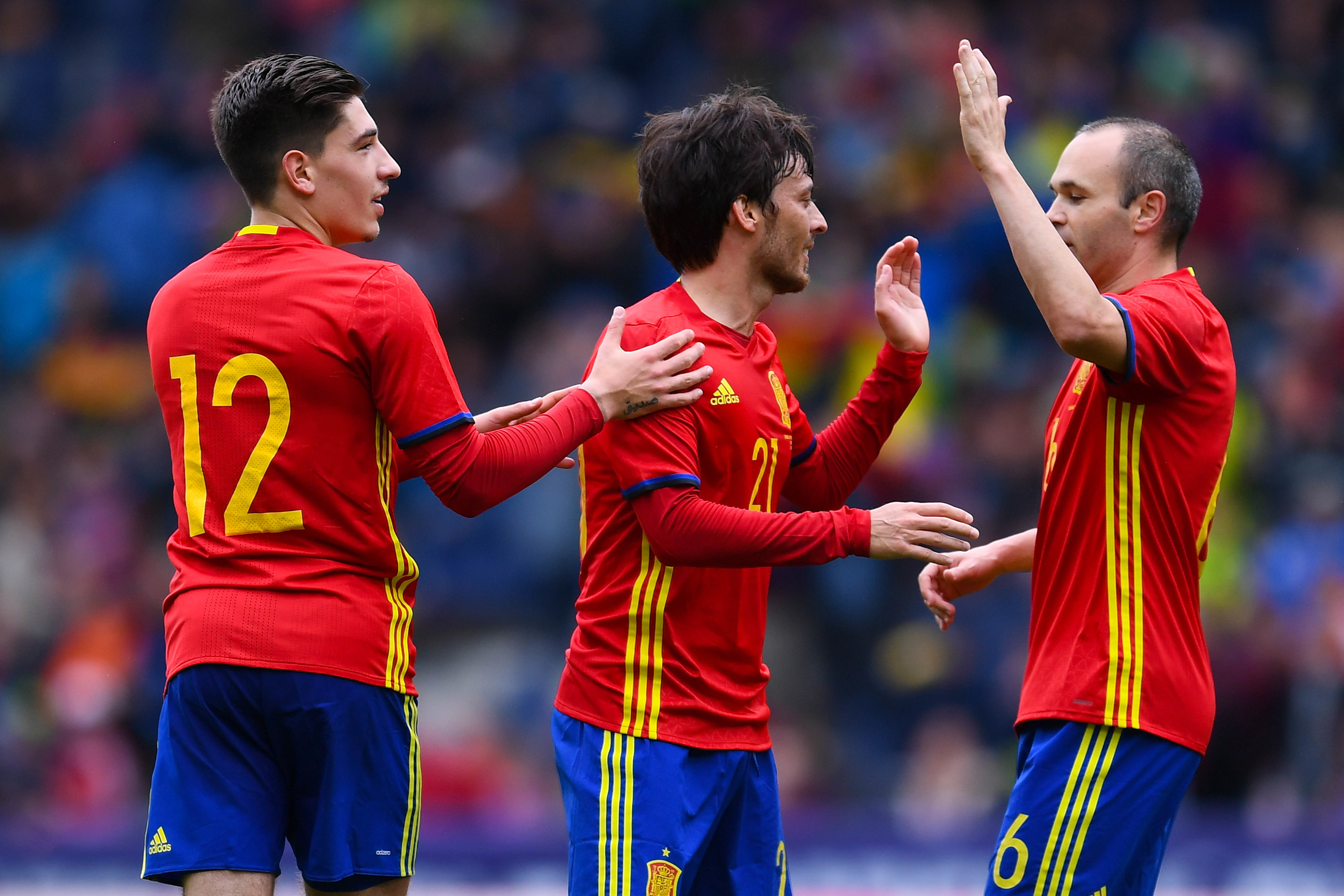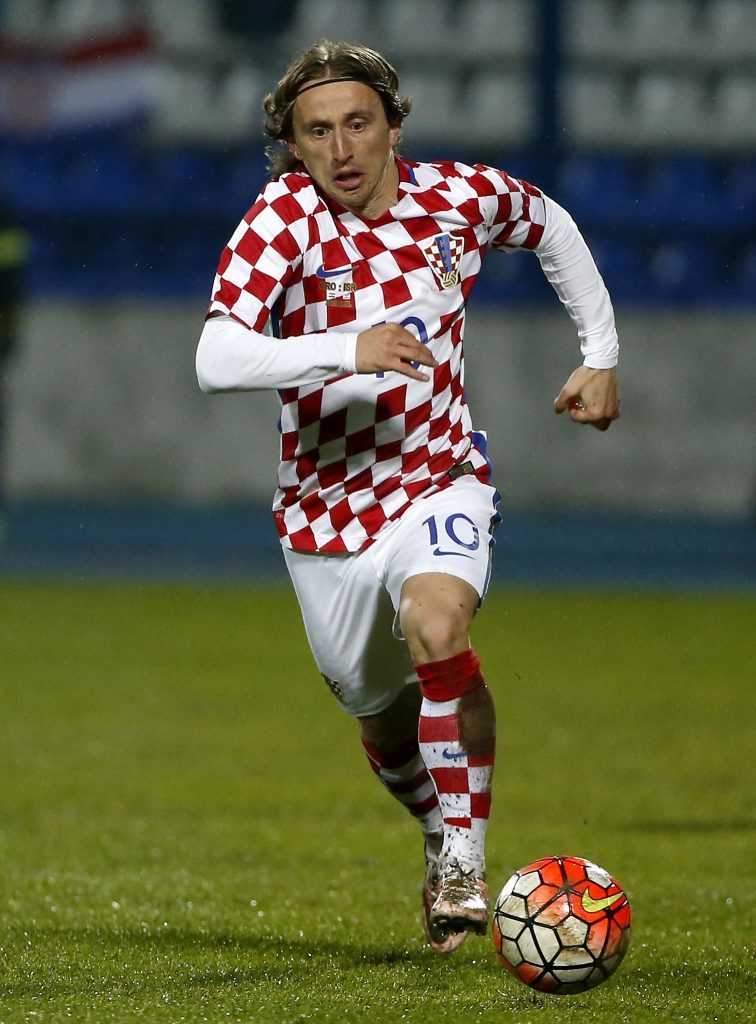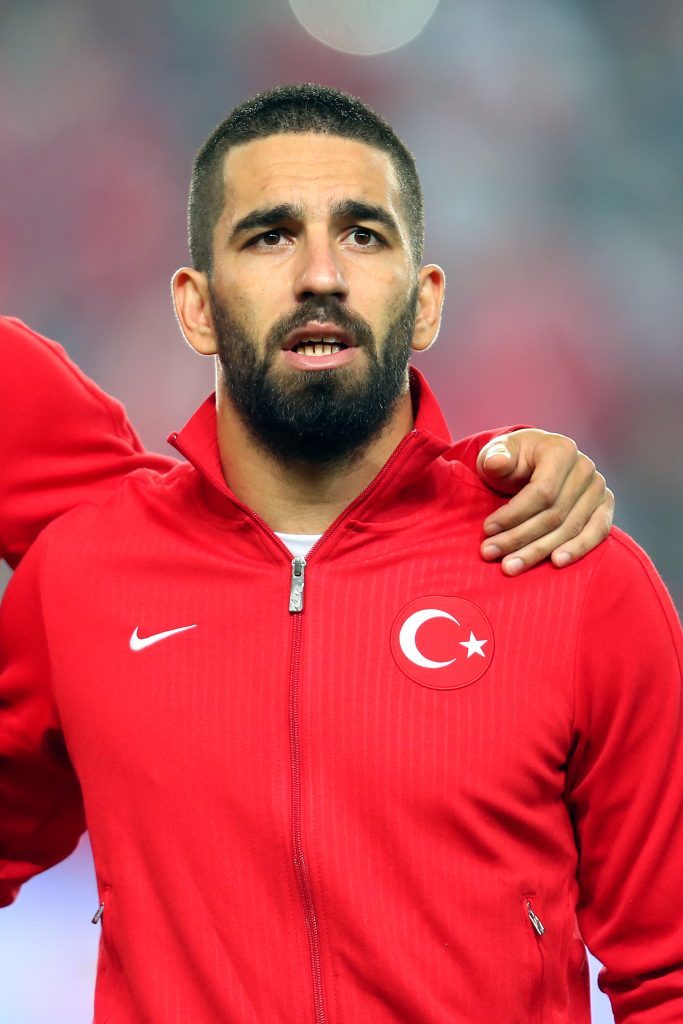
Spain
How they qualified: 1st in Group C; P10 W9 D0 L1 27pts.
Macedonia (h) 5-1; Slovakia (a) 2-1; Luxembourg (a) 0-4; Belarus (h) 3-0; Ukraine (h) 1-0; Belarus (a) 0-1; Slovakia (h) 2-0; Macedonia (a) 0-1; Luxembourg (h) 4-0; Ukraine (a) 0-1.
Coach: Vicente Del Bosque
DEL BOSQUE should be seen as a national hero after leading Spain to World Cup and European glory in 2010 and 2012 respectively.
However, a dreadful World Cup campaign in Brazil 2014 has threatened to taint his legacy in his homeland.
The 65-year-old (right) will call it quits after this tournament and will hope to leave on a high after a strong showing in France.
His team is one in transition but the veteran coach still has more than enough quality at his disposal to expect a relatively simple passage through Group D – and well beyond.
Star player: Andres Iniesta
NOW more than ever, Spain’s hopes of glory rest largely on the shoulders of their diminutive playmaker. At his best, Iniesta is an absolute genius.
When he’s off the boil, he’s merely brilliant. In France he will provide a link between Spain’s opposition-strangling possession play of old and the increasingly dynamic approach demanded by Vicente Del Bosque.
Such is Iniesta’s ability, both technical and mental, he can play both modes just as effectively, and if he is on form alongside Barcelona team-mate Sergio Busquets, few teams will be able to cope with Spain’s range of passing and movement.
ANALYSIS:
IT seems more than a little odd given how recognisable Spain have been during their glory years, but Vicente Del Bosque’s side are heading for France as a bit of an unknown quantity.
The possession-first brand of football that saw them win the European Championships in 2008, the World Cup in 2010, then Euro 2012, has effectively been ditched after they were embarrassed in Brazil two years ago. In its place is a new-found willingness to go direct, try long balls and hit on the counter.
It’s a style that served them well in qualifying, with nine wins from 10 games seeing them comfortably through as Group C winners. However, the confidence that once defined the Spaniards seems to have evaporated.
Xavi and Xabi Alonso have both retired from international football, while David Villa has effectively done the same thing by moving to the USA.
David De Gea, Gerard Pique, Sergio Ramos, Sergio Busquets, Cesc Fabregas and Andres Iniesta are all still key men – and would stroll into the starting line-up of every country at the tournament.
“We have qualified and the FIFA ranking shows we are among the top teams,” says Del Bosque of his side. “There are signs of a change, we must have some patience and I believe we will arrive at the Euros in good condition.”
If that is the case, Spain can target the Final without fear – unknown quantity or not.
Croatia
How they qualified: 2nd in Group H; P10 W6 D3 L1 20pts.
Malta (h) 2-0; Bulgaria (a) 0-1; Azerbaijan (h) 6-0; Italy (a) 1-1; Norway (h) 5-1; Italy (h) 1-1; Azerbaijan (a) 0-0; Norway (a) 2-0; Bulgaria (h) 3-0; Malta (a) 0-1.
Coach: Ante Cacic
CACIC may have led his country to the Finals but Niko Kovac did the leg work.
The luckless Kovac was in charge as the Croats claimed 14 points from their first eight qualifying games, but was sacked after a 2-0 loss to Norway last September.
At 62, Cacic was a controversial replacement. However, two wins from his two games in charge ultimately secured qualification – and the veteran coach has the talent at his disposal to cause a real stir in France.
Star player: Luka Modric
IN Modric, Croatia have a midfielder with the ability to win games almost on his own.
At 30, the former Spurs star is still the most-creative force in the Real Madrid squad. He will play the same role for his country in France, and will be desperate to improve on a disappointing World Cup 2014.
ANALYSIS:
IF Croatia had only one player of Luka Modric’s quality, they would be easy to write off. Instead, their strength in depth makes them dark horses to win the tournament outright.
If their new coach can get his superstars pulling in the same direction, they should escape the tournament’s group of death.
From there, the sky is the limit.
Czech Republic
How they qualified: 1st in Group A; P10 W7 D1 L2 22pts.
Netherlands (h) 2-1; Turkey (a) 1-2; Kazakhstan (a) 2-4; Iceland (h) 2-1; Latvia (h) 1-1; Iceland (a) 2-1; Kazakhstan (h) 2-1; Latvia (a) 1-2; Turkey (h) 0-2; Netherlands (a) 2-3.
Coach: Pavel Vrba
ALTHOUGH a relatively-unknown figure beyond the Czech Republic, Vrba is a legend in his homeland. The 52-year-old took charge of the Czech national team in late 2013 after being named Coach of the Year for the fifth consecutive season.
After stepping up to international level, Vrba has stuck to the attacking approach that served him so well at club level, whilst also turning what looks like an ordinary squad on paper into something far greater than the sum of its parts.
Star player: Tomas Rosicky
AFTER leaving Arsenal last month, Rosicky won’t just be playing for his country in France – he’ll be playing for his future.
The 35-year-old was expected to miss out on a place in the Czech squad after a nightmare, year-long battle with injury. Instead, he snuck in after proving his fitness in training.
ANALYSIS:
UNDERDOG status is something the Czechs are used to. It’s also something they seem to relish.
Petr Cech, Tomas Rosicky and Hertha Berlin star Vladimir Darida are the only big names in a squad made up largely of players from the Czech league and a selection of Europe’s less glamourous clubs. However, with shrewd boss Vrba pulling the strings, neither are they mugs.
Vrba’s side proved their credentials with a group-topping qualification, which included home-and-away wins over the Netherlands and an impressive away win in Turkey.
“Maybe we don’t have famous names, but because of this we work harder to get the best result,” is Vrba’s assessment of his side, which rarely lines-up in any formation other than an adaptable 4-2-3-1.
It remains to be seen whether application alone will be enough to better Spain, Croatia and Turkey – none of whom are averse to hard work themselves.
Turkey
How they qualified: 3rd in Group A; P10 W5 D3 L2 18pts.
Iceland (a) 3-0; Czech Republic (h) 1-2; Latvia (a) 1-1; Kazakhstan (h) 3-1; Netherlands (a) 1-1; Kazakhstan (a) 0-1; Latvia (h) 1-1; Netherlands (h) 3-0; Czech Republic (a) 0-2; Iceland (h) 1-0.
Coach: Fatih Terim
KNOWN in Turkey as “The Emperor”, Terim is in his third spell in charge of the national team, having taken charge during their ill-fated World Cup 2014 qualification campaign.
He is considered the Sir Alex Ferguson of Turkish football, with six league titles, two Turkish Cups, four Turkish Super Cups and a UEFA Cup to his name with Galatasaray, and spells in charge of Fiorentina and AC Milan.
Star player: Arda Turan
TURKEY’S captain took a risk in moving from Atletico Madrid to Barcelona last summer – and it hasn’t yet paid off.
After sitting out his first six months in Catalonia as a result of Barca’s transfer ban, he has subsequently found first-team opportunities limited.
Turan, then aged just 21, was part of the Turkey side that reached the semi-finals of the 2008 Euros. This time around, he will be the player his country’s hopes rest on.
ANALYSIS:
“STATISTICS are like mini-skirts. They don’t reveal everything,” is the kind of quote that has turned Turkey boss Fatih Terim into a hero in his homeland. But if he is to lead his side to the latter stages in France, he will need more than soundbites.
A third-placed finish at the World Cup in 2002 and a semi-final spot at Euro 2008 raised expectations amongst Turkish fans to heights from which they have never descended. This summer, as at any major tournament, failing to reach the quarters will be seen as a failure.
Barelona star Arda Turan will be Turkey’s captain and talisman, while Galatasaray’s Selcuk Inan, and Bayer Leverkusen’s Hakan Calhanoglu, who opted to play for Turkey over Germany, are both dangerous going forward.
Terim’s team remains an outside bet, but their passion and pedigree make them a formidable proposition for their Group D opponents – and, they will hope, whoever they meet beyond.
READ MORE
Group A preview: Hosts France hoping for hat-trick of major wins
Group B preview: Qualification perfection will mean nothing if England fail
Group C preview: No matter what, Northern Ireland’s O’Neill is a legend
Group E preview: Republic of Ireland rely on the Quiet Man and the Raging Bull

Enjoy the convenience of having The Sunday Post delivered as a digital ePaper straight to your smartphone, tablet or computer.
Subscribe for only £5.49 a month and enjoy all the benefits of the printed paper as a digital replica.
Subscribe
